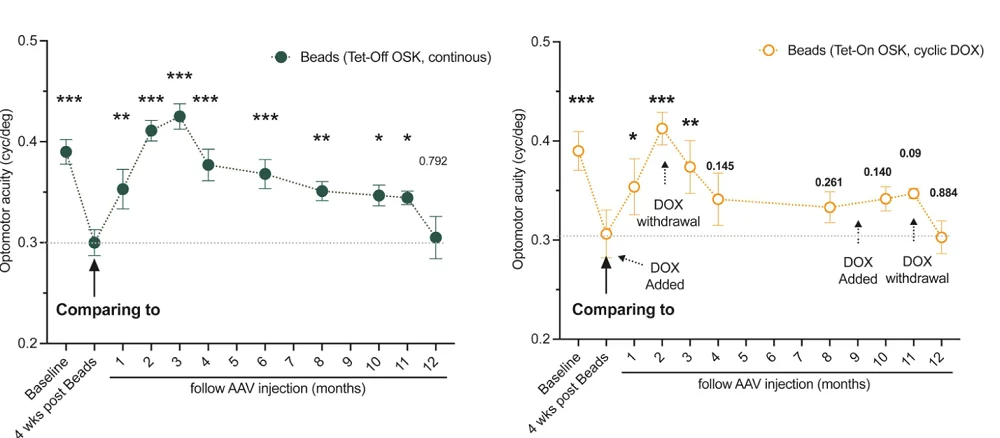In a new study, scientists have achieved significant improvement of glaucoma in a mouse model via partial cellular reprogramming of retinal cells. However, it might take more than that to reverse other aspects of age-related vision loss [1].
The vision of restored vision
The group that authored this paper, led by the prominent geroscientist Dr. David Sinclair of Harvard, has been bringing us exciting news for quite some time. Their chosen target is glaucoma, an age-related neurodegenerative disease and the leading cause of vision loss in the elderly. Glaucoma is usually triggered by increased intraocular pressure and characterized by the progressive loss of retinal ganglion cells (RGCs) and their axons. Today, the only clinically approved treatment is decreasing intraocular pressure via drugs or surgery. This can slow, but not halt, the disease’s progression, and it doesn’t work in all patients.
Sinclair’s group has already achieved impressive results in murine and non-human primate models by partially reprogramming RGCs using three of the four classic Yamanaka factors: OSK [2]. The fourth factor, M (c-Myc), is a known oncogene [3]. It was found that c-Myc is not essential for reprogramming, and foregoing it improves safety.

Read More
Sustained improvement in the continuous model
In this new study, the researchers induced glaucoma in three-month-old mice by artificially increasing intraocular pressure. After the animals’ vision deteriorated, they were treated with viral vectors carrying OSK.
The mice were divided into four groups. The two study groups received RGC-specific viral vectors either with continuous OSK expression or with one induced by doxycycline. The third group was given a sham treatment of viral vectors without subsequent doxycycline induction, and the fourth group was of healthy controls.
Development of glaucoma predictably led to a sharp decline in visual acuity. However, after eight weeks of OSK expression, visual acuity was not only restored but surpassed that recorded at baseline. After this peak, the mice’s vision began declining again, even in the model with continuous OSK expression. However, the decline was much faster in the induced OSK expression group, as OSK expression levels gradually fell following doxycycline withdrawal.
In the continuous expression group, the mice’s vision remained significantly restored and close to healthy levels for 11 months after the beginning of the treatment, although in one more month, it fell sharply. In the induced expression group, the second wave of doxycycline treatment, started nine months after the first one, led to a modest restoration of visual acuity that approached statistical significance versus baseline. Doxycycline withdrawal caused a new sharp drop in visual acuity.

Simply aging
The researchers hypothesize that the gradual decline in visual acuity in the continuous expression group and the attenuation of the treatment’s effect in the induced expression group were caused simply by aging. Normally, mice only live for a bit over two years, and by the end of the experiment, they were experiencing other vision problems besides the induced glaucoma. “It is highly possible” the researchers note, “that at this time, visual acuity is declining, not due to the loss of the OSK reprogramming effect on RGCs, but due to the age-related decline of other retinal layers that did not receive OSK treatment”. In their 2020 study, the group was able to rescue age-related vision loss by partial cellular reprogramming in 12-month-old mice, but not in mice six months older.
Tumorigenesis remains a concern for cellular reprogramming. The researchers closely monitored the mice and found no signs of increased prevalence of tumors or changes in retinal structure. Interestingly, just recently, a study found that continuous expression of OSKM leads to quick health deterioration and death in mice, but this effect was attenuated when OSKM expression was blocked in the liver and intestine [4]. Whether it was due to the absence of c-Myc or to the localization of OSK expression to retinal cells, or both, long-term partial reprogramming appeared to be safe in this case. No adverse effects were recorded.
We performed year-long functional tracking of mice with experimentally induced glaucoma that were treated with AAV2-OSK to induce epigenetic reprogramming in RGCs. Our results indicated that vision loss due to glaucoma can be safely reversed. In the AAV2-tTA; TRE-OSK mice (OSK continuously on), vision loss was restored to healthy levels after 2 months of treatment and remained close to healthy levels for 11 months… Mice that received DOX that triggered OSK expression restored vision to healthy levels by 8 weeks, suggesting that the beneficial effects of OSK treatment can be achieved using a DOX-inducible dual AAV system. When DOX was withdrawn and OSK turned off in these mice, although significance was compromised compared with continuous ON group, the absolute vision performance stays higher than its glaucoma baseline until 11 months post-AAV injection.
Literature
[1] Karg, M. M., Lu, Y. R., Refaian, N., Cameron, J., Hoffmann, E., Hoppe, C., … & Ksander, B. R. (2023). Sustained Vision Recovery by OSK Gene Therapy in a Mouse Model of Glaucoma. Cellular Reprogramming.
[2] Lu, Y., Brommer, B., Tian, X., Krishnan, A., Meer, M., Wang, C., … & Sinclair, D. A. (2020). Reprogramming to recover youthful epigenetic information and restore vision. Nature, 588(7836), 124-129.
[3] Miller, D. M., Thomas, S. D., Islam, A., Muench, D., & Sedoris, K. (2012). c-Myc and cancer metabolism. Clinical cancer research, 18(20), 5546-5553.
[4] Parras, A., Vílchez-Acosta, A., Desdín-Micó, G., Picó, S., Mrabti, C., Montenegro-Borbolla, E., … & Ocampo, A. (2023). In vivo reprogramming leads to premature death linked to hepatic and intestinal failure. Nature Aging, 1-12.





